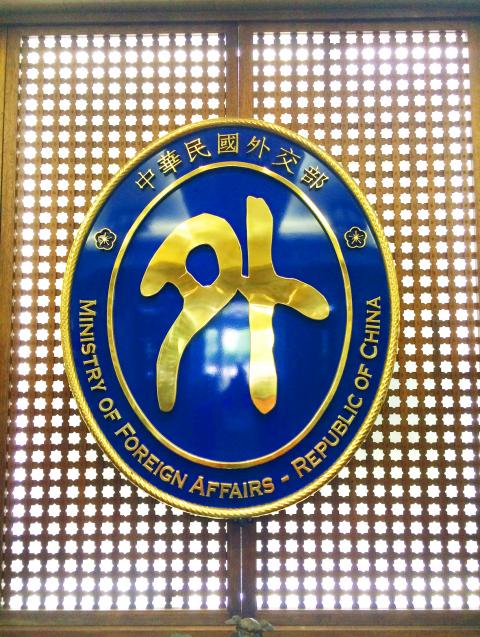The sale of F-16V jets by the US to Taiwan has not been put on hold, the Ministry of Foreign Affairs said yesterday, denying a US media report that the administration of US President Donald Trump has temporarily set aside the sale to facilitate a trade agreement with China.
Taipei has maintained close communications with Washington since a letter of request to purchase the jets was submitted to the US, ministry spokesman Andrew Lee (李憲章) said.
The US is conducting a review and “the sale has not been shelved,” Lee said.

Photo: Lu Yi-hsuen, Taipei Times
The ministry’s comments came in response to a Time magazine report on Friday that said — citing three anonymous US officials — that the administration had shelved the sale until a trade deal with China is sealed.
The White House’s initial decision, reported late last month, to offer tacit approval for Taiwan to buy 60 Lockheed Martin F-16Vs was widely seen as a US show of strength against China, Time said.
However, the decision to delay approval of the sale has contributed to concern among some in the administration that Trump might go soft on China in his desire to secure a trade deal, it said.
It cited the officials as saying that the draft trade agreement being negotiated would boost Trump’s political fortunes and ease jittery stock markets, but it is unlikely to address many of the issues at the core of the US-China trade dispute.
The US Congress must also approve any arms sales to Taiwan, and the administration has yet to submit such a request to lawmakers, the magazine said.
The US Department of State, which opposed the proposed arms sale, has also called for an interagency meeting to determine whether the US can sell M1 Abrams tanks to Taiwan, Time quoted an administration official as saying.
However, Lee said that the relationship between Taiwan and the US has been close and cordial.
“Since President Trump’s inauguration, the US has sold arms to Taiwan twice, demonstrating its firm support for Taiwan’s security,” Lee said.
High-ranking US officials have publicly reiterated their support for the Taiwan Relations Act (TRA), he added.
Signed into law on April 10, 1979, following Washington’s switch of recognition from Taipei to Beijing, the TRA authorizes the US to provide Taiwan with defensive arms.
The Ministry of National Defense yesterday said that the Time report was not based on fact and that US arms sales to Taiwan are in accordance with the TRA and the “six assurances.”
The American Institute in Taiwan said it does not comment on proposed arms sales.
“We only comment after they have been notified to Congress,” the institute said.

Tropical Storm Gaemi strengthened into a typhoon at 2pm yesterday, and could make landfall in Yilan County tomorrow, the Central Weather Administration (CWA) said yesterday. The agency was scheduled to issue a sea warning at 11:30pm yesterday, and could issue a land warning later today. Gaemi was moving north-northwest at 4kph, carrying maximum sustained winds near its center of up to 118.8kph and gusts of 154.8kph. The circumference is forecast to reach eastern Taiwan tomorrow morning, with the center making landfall in Yilan County later that night before departing from the north coast, CWA weather forecaster Kuan Shin-ping (官欣平) said yesterday. Uncertainty remains and

SEA WARNING LIKELY: The storm, named Gaemi, could become a moderate typhoon on Wednesday or Thursday, with the Taipei City Government preparing for flooding A tropical depression east of the Philippines developed into a tropical storm named Gaemi at 2pm yesterday, and was moving toward eastern Taiwan, the Central Weather Administration (CWA) said. Gaemi could begin to affect Taiwan proper on Tuesday, lasting until Friday, and could develop into a moderate typhoon on Wednesday or Thursday, it said. A sea warning for Gaemi could be issued as early as Tuesday morning, it added. Gaemi, the third tropical storm in the Pacific Ocean this typhoon season, is projected to begin moving northwest today, and be closest to Taiwan on Wednesday or Thursday, the agency said. Today, there would likely

DISRUPTIONS: The high-speed rail is to operate as normal, while several airlines either canceled flights or announced early departures or late arrivals Schools and offices in 15 cities and counties are to be closed today due to Typhoon Gaemi, local governments announced last night. The 15 are: Taipei, New Taipei City, Taoyuan, Tainan, Keelung, Hsinchu and Kaohsiung, as well as Yilan, Hualien, Hsinchu, Miaoli, Chiayi, Pingtung, Penghu and Lienchiang counties. People should brace for torrential rainfall brought by the storm, with its center forecast to make landfall on the east coast between tonight and tomorrow morning, the Central Weather Administration (CWA) said. The agency issued a sea warning for the typhoon at 11:30pm on Monday, followed by a land warning at 11:30am yesterday. As of

CASUALTY: A 70-year-old woman was killed by a falling tree in Kaohsiung as the premier warned all government agencies to remain on high alert for the next 24 hours Schools and offices nationwide are to be closed for a second day today as Typhoon Gaemi crosses over the nation, bringing torrential rain and whipping winds. Gaemi was forecast to make landfall late last night. From Tuesday night, its outer band brought substantial rainfall and strong winds to the nation. As of 6:15pm last night, the typhoon’s center was 20km southeast of Hualien County, Central Weather Administration (CWA) data showed. It was moving at 19kph and had a radius of 250km. As of 3pm yesterday, one woman had died, while 58 people were injured, the Central Emergency Operation Center said. The 70-year-old